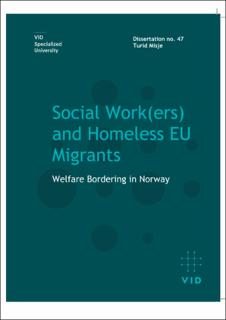| dc.description.abstract | This thesis explores the ‘doing’ and experiences of social work with persons who have very limited rights to assistance from the welfare state – specifically homeless EU migrants – from the perspective of the Norwegian situation. It is an ethnographic study drawing on fieldwork that took place in Oslo between August 2017 and November 2018. The fieldwork included participant observation in settings where encounters between social workers and persons with severely restricted access to public welfare in Norway took place, participation in biweekly meetings of a collaborating unit set up by the City Government of Oslo to coordinate efforts directed at ‘visiting homeless EEA citizens’, in-depth interviews with interlocutors and various stakeholders and engagement with texts such as policy documents and legal sources.
The key question guiding the thesis as a whole is: How does the ‘doing’ of social work in encounters with persons who have limited rights to public social welfare intersect with the Norwegian (welfare) state’s concerns with migration management in general and internal bordering processes specifically? The observations and arguments of the three articles forming part of the thesis accentuate the manifold – seldom straightforward and sometimes conflicting – ways in which Norwegian social welfare policies and the (welfare) state’s concerns with migration management are intertwined and thus how welfare policies and provisions both operate as and create internal bordering practices. Second, the articles show how this intertwinement frames and moulds the configurations of social service provision to, as well as the ‘doing’ of social work with, homeless EU migrants in Norway. In sum, the thesis brings forth how both social workers mandated with administering public social welfare provisions and those who are not get implicated in and contribute to the ‘internalization of borders’ (Persdotter et al., 2021) and ‘welfare bordering’ (Guentner et al., 2016) specifically. Parallelly, the manifold dilemmas this position entails for social workers and the lived experiences of those who are subjected to such bordering processes are explored. A key observation is that these processes are configured and experienced differently for different migrants, and that the regulating and disciplining dimensions are most harshly felt by those most in need of (humanitarian) social services.
The study demonstrates that homeless EU migrants are not simply excluded from the country’s welfare system but rather precariously included (Karlsen, 2021) through policies and provisions directed at ensuring bodily survival. In effect, homeless EU migrants in Norway are left dependent on charity-based social service structures to meet their basic needs. The restrictedness, unpredictability and fragility inherent in this form of inclusion contrasts vi with the principles of social justice, entitlements and equality – principles that are considered cornerstones of the Norwegian welfare state.
The particular combination of measures of care and control in social welfare policies directed not only at homeless EU migrants but also at migrants with precarious citizenship statuses in general, the study asserts, allows the Norwegian (welfare) state to simultaneously manage migration and retain the nation’s self-image of being caring and compassionate. Welfare policies that are both exclusionary and inclusionary, then, implicate individual social workers, as well as the social work profession, in the differentiation of human worth within Norway’s borders and in internal migration control.
Accordingly, my work brings out how the close interrelationship – even interdependency – of the Norwegian social work profession and the national welfare state excludes homeless EU migrants from the mainstream social work field of practice and mandate, including (facilitation of) access to the comprehensive and rights-oriented public social welfare provisions characteristic of the welfare state. Meeting people in precarious situations, who often are visibly poor and live in destitution, while being unable to resort to rights-oriented public social welfare provisions to better such situations appears to create bewilderment and professional insecurity amongst social workers.
While asserting that national borders do indeed produce specific ideas of and demarcations between the ‘belonging’/ ‘deserving’ and the ‘nonbelonging’/ ‘undeserving’ inside Norway’s borders, the thesis asks whether the processes of welfare – and moral – bordering that homeless EU migrants are subjected to may also be interpreted both as indicative of wider transformations of the welfare state and as a continuation of the manners in which the Norwegian state and social workers historically have marked ‘the boundaries of organised social solidarity’ (Lorenz, 2006). Consequently, it urges social workers and the social work profession in Norway to scrutinise and monitor carefully whether their entanglement in processes of welfare bordering risks resulting in the (return to the pre-welfare state’s) ‘policing of the poor’ and reflect on potential implications of such a development for a profession mandated with promoting and realising human rights principles – for all.
Paper I: Misje, T. (2020). Social work and welfare bordering: The case of homeless EU migrants in Norway. European Journal of Social Work, 23 (3), 401–413. https://doi.org/10.1080/13691457.2019.1682975
Paper II: Misje, T. (2021). Queuing for food and playing lottery for beds: A parallel social service system and the lived experiences of humanitarian service provision to homeless EU migrants in Norway. Nordic Social Work Research, 11 (2), 103–116. https://doi.org/10.1080/2156857X.2020.1857820
Paper III: Misje, T. (2022). The precarious inclusion of homeless EU migrants in Norwegian public social welfare: Moral bordering and social workers’ dilemmas. Critical Social Policy, 42 (3), 448–468. https://doi.org/10.1177%2F02610183211036580 | en_US |
